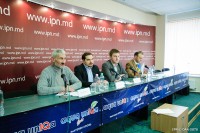Civic Coalition for Free and Fair Elections: The Parliamentary Elections of 30 November 2014 were Free and Partially Fair
1 December 2014
Based on the principles[1] that govern free and fair elections, namely:
- Ensuring a campaign environment unmarked by violence;
- Absence of attempts to intimidate candidates or prevent them from presenting their political programs;
- Equal chances for all electoral candidates, which includes, among other things, a neutral attitude of state authorities towards the campaign;
- Ensuring the right of all citizens to vote;
- Non-discriminatory access to media for all candidates and unbiased coverage of the campaign by mass media, especially publicly-owned outlets and broadcasters;
- Free media;
- Voters’ right to form an opinion;
- Accurate voter lists; and
- A clear separation of parties and state, which, among other things, entails that those in power shall not use public resources for party purposes during campaigns, with the exception of cases provided by law.
The Civic Coalition for Free and Fair Elections
Finds an improvement in the legal and normative framework established by the Central Electoral Commission (CEC) for organizing elections in comparison with the 2010 parliamentary elections;
Welcomes the opening of more polling stations for Moldovan citizens from the Transnistrian region and for those abroad. Nevertheless, despite the use of the State Voters’ Register, citizens from the Transnistrian region were not legally allowed to cast their vote at a polling station of their choosing, but had to vote at special designated polling stations;
Regrets the attempts of intimidation of candidates, and cases when the candidates were prevented from presenting their electoral platforms;
Finds biased reporting on the campaign by many media institutions and regrets the lack of response by the Broadcasting Coordination Council (BCC), which failed to employ sufficient and effective sanctions;
Appreciates the increased efforts of the CEC and the civil society to conduct voter information and civic education campaigns; and
Regrets the decreased interest among broadcasters in informing or educating the public in comparison with the 2010 campaign for parliamentary elections;
Finds that the Electoral Code continues to contain restrictions on the right to vote by persons suffering from mental health issues (contrary to the UN Convention on the Rights of Persons with Disabilities); and
Appreciates the effort of the CEC to facilitate the voting process for persons with impaired vision in 56 polling stations. However, more comprehensive measures must be taken to ensure the voting rights of persons with disabilities by adopting special procedures in that regard.
For these reasons, the Civic Coalition for Free and Fair Elections believes that the parliamentary elections on 30 November 2014 were free.
At the same time, however, the Coalition assesses the elections as partially fair for the following reasons:
The Parliament set the date of elections long before the actual electoral campaign, thereby allowing some parties and leaders to conduct political activities resembling campaigning, which is contrary to electoral legislation;
The electoral campaign was marked by a wide use of administrative resources, and a number of incidents, including cases of electoral gifts, intimidation of voters and unauthorized campaigning and party-related advertisements;
Many shortcomings were found in the CEC and local electoral bodies’ activities. In the Coalition’s opinion, the CEC decision to raise the ceiling for electoral spending; limit the right to peaceful assembly for certain electoral candidates; and allow voting based on expired IDs or without a valid residence permit represent shortcomings that leave room for misinterpretation and raise suspicion of deliberate bias;
Although we acknowledge and appreciate the development of the State Voters’ Register and the online publication of voter lists, the Coalition found numerous shortcomings in regards to the functioning of the electronic Register application on Election Day;
The Civic Coalition for Free and Far Elections found that the media, namely Prime TV, Canal 3, Publika TV, Canal 2 and Jurnal TV, exhibited biased reporting during this campaign.
Voters from the Transnistrian region could cast their votes at any of the special designated polling stations. However, this right was not fully ensured, as state authorities did not create conditions to properly inform citizens in the region about the 30 November elections;
The Coalition is very concerned about the incomplete reporting of financial means collected and spent by the candidates during the campaign. In this regard, the Coalition disapproves of the Parliament’s failure to pass legislation to ensure financial transparency during elections. In the Coalition’s opinion, the elimination of a candidate from the race indicates the urgent need to pass improved legislation that will ensure the transparency of political parties and their electoral campaigns;
Despite the fact that a majority of political parties and electoral candidates publicly committed to ensuring equal representation of women and men in their candidates’ lists, the Coalition finds that gender equality is only declarative and not implemented or represented fully in terms of candidate lists or policies within candidates’ manifestos.
Council of the Civic Coalition for Free and Fair Elections

